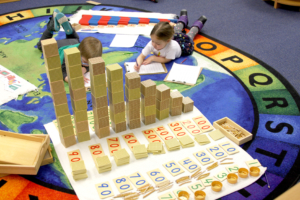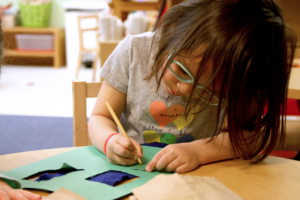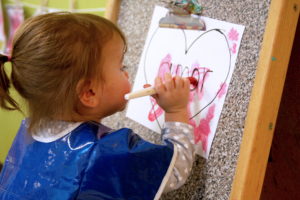
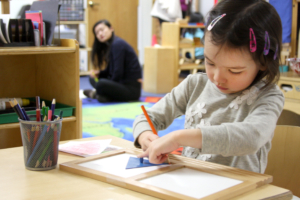
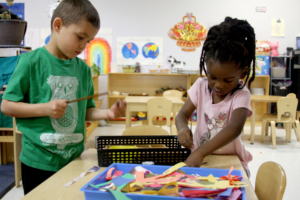
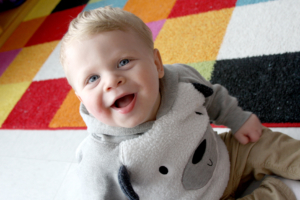
At Monarch, we cultivate the love of learning that carries on throughout a child’s educational journey, not only preparing them for college but for life!
Congrats…You took the first step to your child’s future success! Sign up for your personal tour now! Fill out the interest form for the appropriate age group you are looking for and we will reach out to schedule your tour. General questions? email: enrollment@Monarchm.com
Infants
(6 weeks through 15 months)
Infant Schedule
The daily schedule in the infant environment is tailored specifically to the needs of the infant. Upon enrollment parents provide a schedule of their child’s typical routine. This helps ease the transition for the child. Teachers will follow this schedule and keep note of occurrences throughout the day. Each day parents are provided a written schedule of feedings, diaper changes and naps.
Feeding and Changing
• Parents are responsible for providing all meals for their infant.
• Each classroom is able to store and heat formula as well as fresh or frozen breast milk.
• All bottles and breast milk must be labeled with the current date.
• Parents supply all diapers, cream, and extra clothing for their child.
• We are able to accommodate the use of cloth diapers.
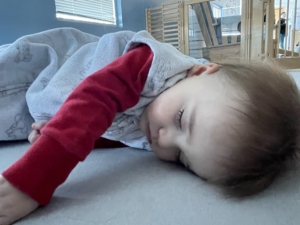
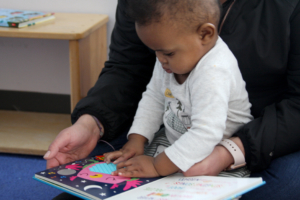
Program Overview
From the moment infants are born, they begin learning and observing everything around them. They respond to touch, sound, light, taste and smell. That learning continues every day through each experience. The “Nido” (nest in Italian) is a prepared environment that is small, warm, safe and comforting for the infant. The staff is wonderful at responding to each child’s needs and fostering their curiosity. Dr. Maria Montessori says, “Our work as adults does not consist in teaching, but in helping the infant mind in its work of development.” Each child is respected as an individual and the Nido teachers provide a safe and reassuring beginning. As a result, the child is a joyful and confident learner; happy to explore and practice new skills.
- The Nido classrooms can each have up to 10 children ranging in age from 6 weeks to 15 months.
- The student to teacher ratio in the Nido Program is 1:5.
- Children sleep on specially designed floor futons rather than in a crib. This allows the child to make the choice to fall asleep rather than being forced by the caretaker to sleep in a confining crib.
- Consistency between home and school life is imperative at this stage. There is daily communication between the Nido teachers and infant parents about schedules, changing, feedings, and infant milestones.
Toddlers
(15 months though 3 years)
Toddler Schedule
A full day in the toddler environment includes a nutritious breakfast, lunch and afternoon snack. The children have morning work time providing the opportunity for activities that engage fine motor manipulation, problem solving, sorting, vocabulary development and various other concepts. Children have an afternoon rest and nap time. Twice daily children play outdoors weather permitting; otherwise there is an indoor gross motor environment.
Montessori Materials
Most toddler works are self-correcting; like a puzzle, the child is able to see when a piece has not been put in right, it doesn’t fit. This builds a child’s desire for internal correction, rather than an adult telling them they did it wrong. Many of the works are simple and direct- they focus on the skill that is being refined. All of the work is hands on and engaging for the child. Montessori promotes discovery through the hands as a pathway to the mind. Children need to feel and manipulate objects to truly discover.
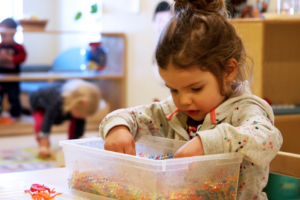
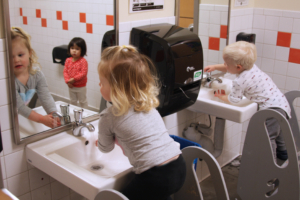
Program Overview
When a child reaches this stage, his or her curiosity is heightened and the desire to explore is expansive. Basic motor coordination, independence and language development are fostered and individual personalities are respected. Practical life skills such as toileting, dressing, feeding themselves and mastery of routine tasks develop fine and gross motor skills, independence, self-esteem, sense of order and a joy of learning. Sensorial activities entice exploration and are enhanced with language as their discoveries and experiences need names. Materials are intended to inspire and awaken curiosity with even the youngest children. Children are engaged in social learning and experiences while routines are established.
- Breakfast and Lunch are provided by Monarch Montessori and are included in the tuition cost.
- Parents are responsible for providing snacks and a water bottle for your child. Each classroom has a refrigerator for perishable items.
- Indoor shoes are required (we recommend Crocs). These shoes will remain in your child’s cubby and be put on and taken off at drop off and pick up.
Children’s House
(3 years through 5 years)
Children’s House Curriculum and Materials
The materials in our classrooms were developed by Dr. Maria Montessori. She developed hands on materials that are attractive to the child and help develop very specific skills. The materials are carefully organized on shelving for students to choose from. The lessons on the work are given when a student is ready and then is allowed to continue to master the work before moving to the next lesson. The work also allows for explorations beyond the lessons called extensions.
There are five areas in a Montessori classroom that create the holistic education.
- Practical Life
Upon first entering the Montessori school children are given the opportunity to develop important life skills which will allow them greater freedom in the classroom. They learn to manage their own clothes using dressing frames to practice buttons, zips and bows. They are also shown how to care for the classroom, using child-sized brushes and dusters. Developing practical skills, such as pouring drinks from a jug and laying tables, and social skills with friends and teacher enable each child to feel that they are capable, self-reliant members of the community. - Sensorial
A child’s first experience with learning is through the senses. Montessori schools use a range of well thought out exercises to help children sort, match and compare objects by shape, size, touch, taste and sound. These early sensorial impressions boost children’s powers of observation and discrimination, broaden their vocabulary and contribute to their later understanding of formal education concepts. - Literacy
Montessori’s language materials are based on a carefully a structured phonic approach to writing and reading. Recognized for their excellence, they are used widely in many non-Montessori schools and settings where special help is required. First, children learn sensorially by tracing sandpaper letters with their fingers while they are told the sounds. Soon they are writing simple words with movable letters, matching words with objects and reading their first stories in phonic readers. When asked how they learned to read and write Montessori children will often answer, “I did it myself.” - Mathematics
Essentially mathematics is about understanding relationships in the environment and being able to express them in mathematical terms. Montessori materials, like the number rods, golden beads and spindle boxes, are simple and interesting and provide step-by-step learning. They are also self-correcting, which means that children can see at a glance if they have made a mistake and can put it right without a teacher’s help. This enables them to progress at their own rate and understand each stage thoroughly before they move on to the next stage. - Cultural
In the Montessori classroom children use globes, puzzles maps and flags to underpin activities which build their understanding of other cultures and people. Children are also taught to match, classify and name the elements and species of the natural would by using picture and name cards. Classroom plant growing and caring for pets help to form a bridge between the child’s knowledge of the immediate environment and the wider world.
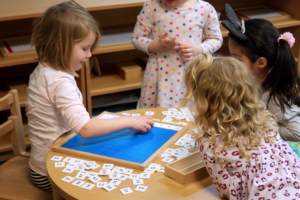
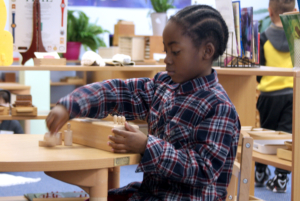
Program Overview
Throughout the ages of 3-5, children are at a time of great transformation from dependency to a “let me do it myself” mentality. The Children’s House environment is a community designed to progress each child at their level as lesson plans are individualized to scaffold learning in areas of practical life, sensorial, mathematics, language development, culture, art and more. We offer a three hour work period that builds concentration, meets a child’s need for order and helps them explore the important roles they play within their family, community and their culture to become independent beings. Children choose their own activities and work independently at their own pace under gentle guidance of trained teachers. In this way a child’s innate curiosity and love of learning are fostered.
Children’s House Schedule
The three hour work cycle provides opportunities for children to develop academic, motor and social skills as well as concentration, independence and self-esteem. The environment is prepared to allow the child to move freely within the classroom and to choose from the materials developed by Dr. Montessori. Children enjoy lunch with their teachers and an afternoon nap. We believe that fresh air is an important part of the day and children spend time on the playground daily.
Our Children’s House (Preschool) is a 10 month program, aligned as closely as possible with the Denver Public School schedule. We have a two month Summer Break, wherein we offer a Summer Camp program.
